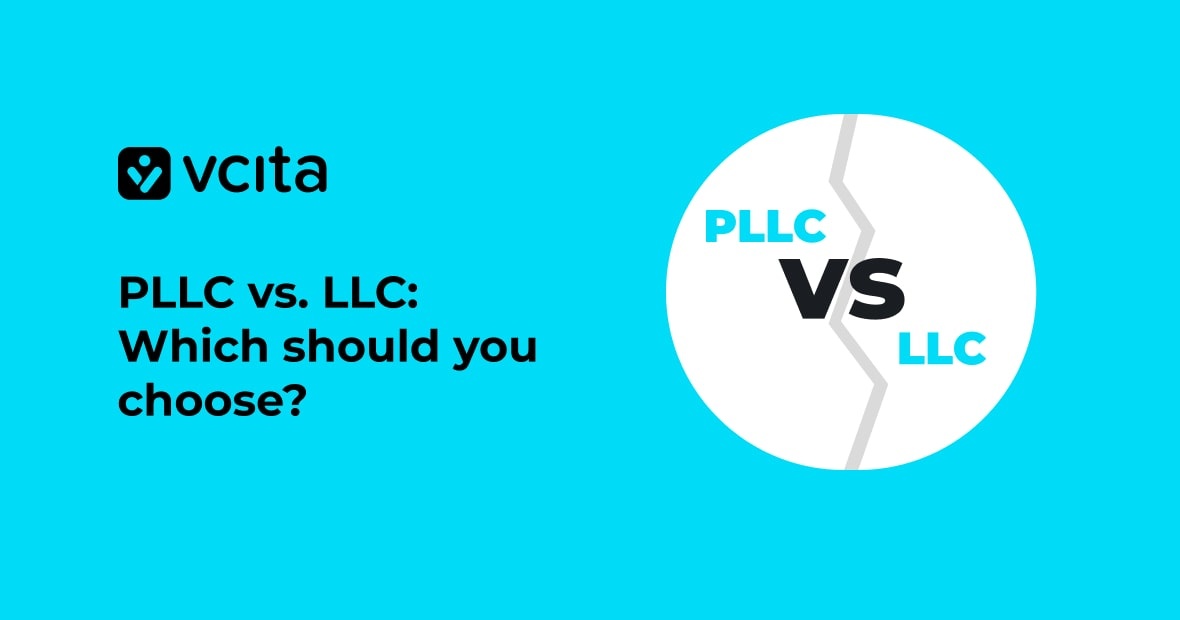As a small business owner, you need to give careful thought to the best way to structure your new venture. With so many options – sole proprietorship, LLC, PLLC, or corporation – it can get confusing fast.
What’s more, some business types are best served by certain business structures. If your business provides professional services, like law, medicine, or accounting, a PLLC limit your personal liability while letting you maintain a professional license and could be better than an LLC.
Before jumping in, learn the key differences between a standard LLC and PLLC, from management structure to eligibility requirements. Arm yourself with knowledge before deciding which business entity fits your goals and protects your personal assets, as you turn your business ideas into reality.
LLC vs PLLC: What’s the difference?
A PLLC, or professional limited liability company, is designed for licensed professionals like doctors, lawyers, architects, and accountants. Business owners in these fields may want to consider forming a PLLC over a standard LLC.
The main differences between the two business structures are:
Ownership requirements
To form a PLLC, all members must hold a professional license in the field of business. An LLC has no such requirement, so ownership is open to anyone. However, an LLC formation requires essential documentation with the state’s business office while forming a PLLC involves a few additional steps due to licensed professionals. Hence, the approval time for LLC is usually quicker than PLLC.
Liability protection
An LLC shields owners from personal liability for business debts and liabilities, but a PLLC does not. PLLC members are responsible for their own malpractice insurance and any claims.
Management structure
PLLCs typically have more restrictions on ownership and control. Often, only licensed professionals can have ownership stakes or voting rights. LLCs have more flexible management structures, and ownership is open.
Tax treatment
Like LLCs, PLLCs are pass-through entities, so business income and losses pass through to owners’ personal tax returns. Both are taxed once at the member level.
For many small professional businesses, a standard LLC may provide all the benefits you need to get up and running. But for licensed fields an LLC can’t accommodate, a PLLC could be your ticket to turning your business ideas into a reality.
Who can form a professional limited liability company (PLLC)?
In general, only members of licensed professions are eligible to form a PLLC. This includes doctors, lawyers, architects, engineers, and accountants. If your occupation requires a professional license or certification to practice, there’s a good chance you can establish a PLLC.
Professionals require special approval
Unlike a standard LLC, your state licensing board has to approve your request to form a PLLC before you can file articles of organization with the state’s secretary of state. This extra step ensures the PLLC structure complies with regulations for your industry. Once approved, you can proceed to establish the PLLC like any other business entity.
The key benefits of choosing a PLLC for your small business
If you run a small business providing professional services, forming a professional limited liability company (PLLC) offers some appealing benefits over a standard LLC.
Flexible management structure
Like an LLC, a PLLC offers flexibility in how you structure management and allocate profits and losses. As members of a PLLC, you can divide up ownership and control as you see fit. You have the freedom to choose between member-managed or manager-managed structure. This flexibility allows you to customize your business entity to best suit your needs.
Pass-through tax treatment
PLLCs are pass-through entities, meaning the business itself does not pay taxes on profits. Instead, taxes are passed through to the individual members to report on their personal tax returns. This avoids the double taxation of profits that corporations are subject to. The pass-through structure can provide tax flexibility and benefits for small professional businesses.
Asset protection
A key benefit of the PLLC is that it shields your personal assets from liability associated with your professional services, just like an LLC. However, PLLC members also carry their own malpractice insurance. This protects you from personal liability in case of lawsuits related to your licensed profession while still keeping your business assets separate.
Overall, forming a PLLC allows professionals to take advantage of liability protection while operating a business that provides licensed services.
The potential drawbacks of a professional LLC
While PLLCs offer liability protection, they may still have some disadvantages compared to a standard LLC.
Taxation complications
Since PLLCs must recognize profits immediately, business owners could face taxes on unrealized profits. This “pass through” tax treatment means PLLCs themselves do not pay taxes, but the owners pay taxes on the PLLC’s profits and losses on their personal tax returns. This can make your tax return management more complex.
Management restrictions
For professionals, forming a PLLC means giving up some flexibility in management structure. Because PLLCs are regulated, they typically have more restrictions on ownership and control. Professionals cannot delegate responsibilities or share ownership and control as easily as with a standard LLC. Doctors, lawyers, accountants and others forming a PLLC must maintain control and ownership of the business.
Liability risks
While PLLCs shield personal assets from business debts and liabilities, professionals’ personal liability is still at stake. The business’s debts and liabilities could damage their professional reputation and credibility, and if the PLLC is sued or faces malpractice claims, their professional licenses and reputations are on the line. PLLC members are also responsible for carrying their own malpractice insurance and are personally liable for malpractice claims against the business.
Limits on forming a PLLC
Some states prohibit certain professionals from forming PLLCs altogether. Only professions legally eligible to form a PLLC can organize as one. In some cases, professionals must form a professional corporation instead. Before choosing a PLLC, check with your state’s regulations regarding your profession.
How to decide: is a PLLC or standard LLC better for your business?
If you provide professional services, you’ll need to determine if forming a Professional Limited Liability Company (PLLC) or a standard LLC is the better choice for your business. Here are the main issues to consider.
Greater protection from malpractice claims
PLLCs offer licensed professionals like doctors, lawyers, and accountants extra protection from malpractice lawsuits. Since PLLC members are responsible for their own malpractice insurance, your personal assets are shielded if a claim is filed. With a standard LLC, your personal assets could be at risk.
More difficult to establish
Although PLLCs provide attractive benefits, they are more complex to create. You must file articles of organization with your state’s Secretary of State and also maintain a professional license. The management structure and operating agreement must comply with regulations for your profession. In contrast, forming an LLC is typically an easier process.
For many small professional service businesses, the pros of a PLLC outweigh the extra hassle. The pass-through tax treatment, liability protection, and credibility of a PLLC can be advantageous. However, if you’re unsure of your business ideas or want an easy setup, an LLC may suit your needs.
The right business structure could be key to business success
The choice between an LLC and a PLLC is an important one for your business entity, but with a little research, you’ll pick the best structure to protect your personal assets and support your business ideas. Forming a PLLC does require additional paperwork, like filing articles of organization with your state’s Secretary of State and obtaining a professional license. However, for small professional businesses, the benefits of liability protection, flexibility, and tax efficiency offered by a PLLC may well be worth the extra effort, and give you the support to focus on growing your business.




























